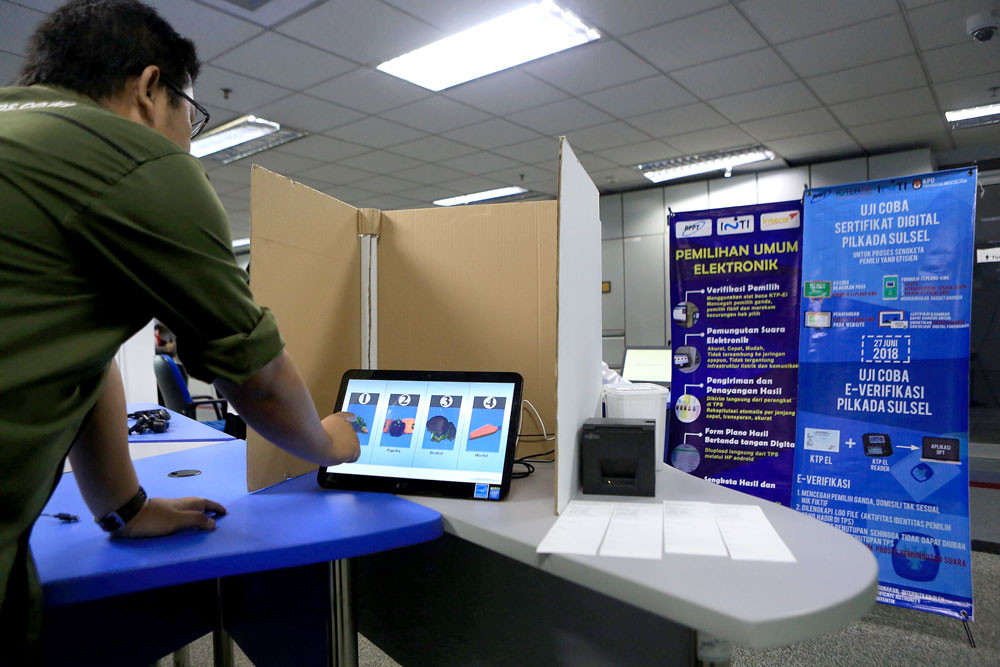Popular Reads
Top Results
Can't find what you're looking for?
View all search resultsPopular Reads
Top Results
Can't find what you're looking for?
View all search resultsGoing digital to save lives
As the death toll of poll workers and security personnel reached 583 as of last Friday, speculation has been rife as to why so many officials lost their lives during and after the performance of their state duties.
Change text size
Gift Premium Articles
to Anyone
 Going digital: An Agency for the Assessment and Application of Technology official demonstrates the e-voting system in Jakarta. The government may implement e-voting to replace the manual voting system. Hundreds of polling station workers reportedly died of fatigue after days of organization and ballot reporting. (The Jakarta Post/Seto Wardhana)
Going digital: An Agency for the Assessment and Application of Technology official demonstrates the e-voting system in Jakarta. The government may implement e-voting to replace the manual voting system. Hundreds of polling station workers reportedly died of fatigue after days of organization and ballot reporting. (The Jakarta Post/Seto Wardhana)
A
s the death toll of poll workers and security personnel reached 583 as of last Friday, speculation has been rife as to why so many officials lost their lives during and after the performance of their state duties. Government critics have gone so far as to demand autopsies be performed on each of the volunteers who perished, out of suspicion that they were victims of premeditated murder.
Although there may be political motivation behind such conspiracy theories, a thorough investigation is required to put an end to the controversy. More importantly, the government and the General Elections Commission (KPU) can take action based on recommendations resulting from the investigation to prevent so many deaths from occurring in future elections.
That said, the way we organize the simultaneous presidential and legislative (and perhaps regional) elections needs an overhaul in order to save many lives, as well as time, energy and money. Reinstating separate legislative and presidential elections would only mark a setback.
Improvements the KPU had hoped to see from the concurrent elections included efficiency and less room for horse-trading among political parties. The cost-saving goal has been achieved as the KPU was able halve the budget allocated for stipends for poll workers, the procurement of poll materials and registration of voters. The new system also forced political parties to make a deal on presidential and vice-presidential candidates long before the elections, giving voters certainty and more time to ponder their choices.
The deaths were among the side effects of the simultaneous elections that we failed to anticipate. What we need now is to learn from the failure, rather than to restore the old system.
There may be some steps that we missed, particularly one that required poll worker candidates to undergo medical checks. It has become an open secret that the procedure was mostly ignored as the poll workers could easily obtain a clean bill of health from doctors.
The volunteers died after working from 6 a.m. on April 17 until in the morning the day after. They had to set up the polling station on the eve of polling day and notify every eligible voter of where to cast ballots by April 14. This heavy workload has led to allegations that they died of fatigue.
As if to clarify media reports, chairman of the Indonesian Doctors Association (IDI) Daeng M. Faqih said that exhaustion would be unlikely to be the poll workers’ cause of death. He asserted, however, that a state of fatigue could trigger and exacerbate other health problems. Many of the poll workers had in fact suffered from heart disease, hypertension, diabetes and other illnesses that were aggravated by lack of sleep, water and a healthy work environment.
There is no legitimate reason to step backward. Policymakers need only to ease the burden of poll workers, who on April 17 had to fill many forms manually. Digitalizing the administrative procedure could at least make their jobs easier and prevent problems.









